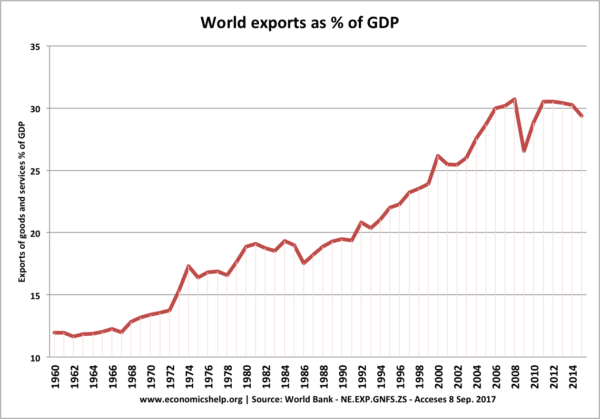Globalisation refers to the increased integration of the world economy. The process of globalisation involves increased trade, greater mobility of labour and capital and the increased interdependence of national economies.
There are many aspects of globalisation that are irreversible.
Improvement in transport and communication. Air travel has made it easier for people to travel around the world. This is likely to continue to grow over the coming decades. Potential new technology has included air travel which involves entering into space altitudes for faster travel between countries. New technology, if anything, will make it even easier and cheaper to cross continents and national boundaries in the future. China had developed such strong trade links with Europe that it is funding a transcontinental railroad which will be able to transport goods across land.
The growth of multinationals. New trade theory has stressed the role of economies of scale and specialisation. This means companies that become increasingly specialised with a large output are able to thrive. The growth of multinational companies benefitting from economies of scale is likely to increase. Global brands are increasingly powerful, with consumers in the developing world attracted by minimum standards of quality.
- In the developed world, there has been a partial backlash against the dominance of multinationals – with some consumers expressing a preference for local, differentiated products. But, this has not held back the dominant trend which is the growth of global brands, products and companies.
Increased interdependence of global production. When we talk of UK car manufacturers, it only tells part of the story. UK car production is mostly foreign owned and relies on imports of components, such as engines and tyres. It is difficult, if not impossible, to return to a situation of pure 100% domestic production of goods and services. Supply chains are increasingly global – with little distinction between national boundaries.
World trade. World trade has grown faster than world GDP. Since 1945, world trade has grown at a rate of 7% a year, compared to global growth of 3%.
The World Trade Organisation has attracted the vast majority of countries to join, and there is further scope for trade liberation and trade growth.
- Recent years has seen a revival of protectionist sentiments – especially in the US, with President Trump promoting a brand of “America First” which suggests a willingness to put tariffs on firms and discouraging outsourcing of jobs. However, even a revival in protectionist sentiment is unlikely to reverse the long-run trend rate in global growth.
- Even if world trade were to dip for a few years, it is likely to bounce back – like after every previous dip. Also, it is worth bearing in mind, that despite the rhetoric of “Trump first’ exports and trade are still very important to US economy. As of yet, there has not been a fundamental assault on the principle of trade and globalisation. There is a practical difficulty of shifting car production back to the US – when the industry is so globalised and fragmented with parts imported from different economies.
Also, in the past three decades, there has been a shift in the share of global GDP. As a share of the world economy, the US and Europe have declined – whilst China, India and the BRIC countries take a larger share.
- In 1960, US GDP accounted for 40% of world GDP. In 2012 that had fallen to 22% (US role in world GDP)
- In 1950, China GDP accounted for 4.6% of world GDP. By 2008 that had risen to 17.6% (Share of World GDP through history)
Many developing and emerging economies have the potential for economic growth and development which will increase global trade and increase diversity of globalisation. For example, in recent years, China has increasingly invested in Africa – to help access the raw materials of China. This investment, along with other factors, has the potential to transform the African economy into an increasingly diverse economy.
What could cause the process of globalisation to slow down or reverse?
Globalisation could slow down if:
- Protectionist sentiments become widespread and countries retreat into previous attitudes of trying to be self-sufficient. It would require a prolonged change in economic attitudes to translate ‘protectionist sentiment’ into real changes to globalisation.
- Environmental costs. If the global temperature rose another 1-2 degree it could cause serious environmental costs – extreme weather events and depletion of natural resources. In an extreme case, this could cause shock to global growth and reverse the post-war trend for rising GDP and rising living standards. If resources become more scarce, it can also encourage more protectionist sentiments.
- Government policy Could government policy reverse globalisation? One example is stricter immigration laws, stricter laws on the mobility of capital – for example, higher taxes on foreign investment in the housing market. This would slow down one aspect of globalisation.
- Covid-19 Pandemic. In 2020, the Covid-19 Pandemic caused countries to impose travel restrictions and close borders. This was a major disruption to the process of globalisation. When people get out of the habit of flying around the world, they can become more insular and used to staying in the same country.
Evaluation
Globalisation is not a new phenomenon, we have seen a gradual process of globalisation ever since man left Africa. Recent centuries and decades have accelerated this process and globalisation is increasingly hard to ignore as it transforms societies and economy. It is hard to avoid the conclusion, that there is a certain inevitability of future globalisation.
It is possible, some unexpected event may seriously derail globalisation – such as an adverse environmental shock. But, on the other hand, environmental problems place emphasis on a global solution, which brings countries together to find a solution.
Related


